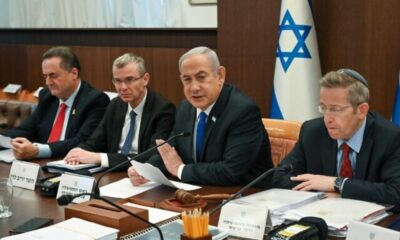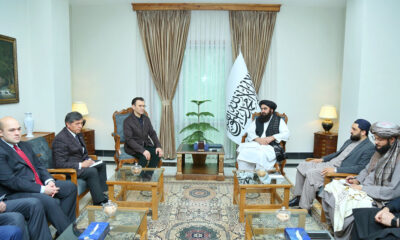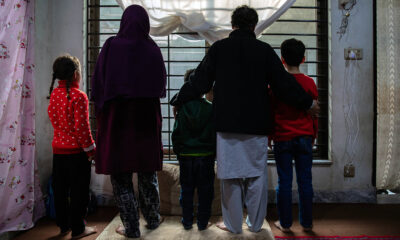World
‘Stop playing’ with Russia, end war: Zelenskiy tells West
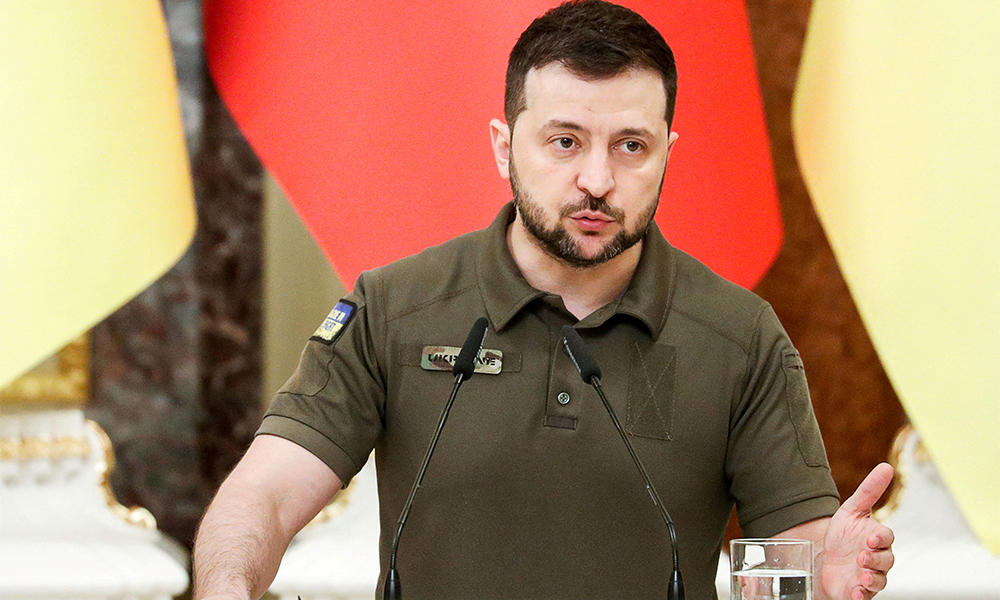
President Volodymyr Zelenskiy urged the West to stop playing around with Russia and impose tougher sanctions on Moscow to end its “senseless war” in Ukraine, adding his country would remain independent, the only question was at what price.
Zelenskiy’s criticism of the West has mounted in recent days as the European Union moves slowly towards a possible Russian oil embargo and as thousands of Russian forces try to encircle two key eastern cities of Sievierodonetsk and Lysychansk.
Three months into its invasion of Ukraine, Russia has abandoned its assault on the capital Kyiv and is trying to consolidate control of the industrial eastern Donbas region, where it has backed a separatist revolt since 2014.
Western military analysts see the battle for Sievierodonetsk and Lysychansk as a potential turning point in the war after a shift in momentum towards Russia following the surrender of Ukraine’s garrison in Mariupol last week.
“Ukraine will always be an independent state and it won’t be broken. The only question is what price our people will have to pay for their freedom, and what price Russia will pay for this senseless war against us,” said Zelenskiy in a late-night address on Thursday.
“The catastrophic unfolding events could be still stopped if the world treated the situation in Ukraine as if it were facing the same situation, if the powers that be did not play around with Russia but really pressed to end the war.”
Zelenskiy complained about disagreements within the EU on more sanctions against Russia and asked why some nations were being allowed to block the plan.
The EU is discussing a sixth round of punitive measures,including an embargo on Russian oil imports. Such a moverequires unanimity but Hungary opposes the idea for now on thegrounds its economy would suffer too much.
“How many more weeks will the European Union try to agree ona sixth package?” Zelenskiy asked, noting Russia was receiving one billion euros a day from the 27-nation bloc for energy supplies.
“Pressure on Russia is literally a matter of saving lives.Every day of procrastination, weakness, various disputes orproposals to ‘pacify’ the aggressor at the expense of the victimmerely means more Ukrainians being killed.”
Zelenskiy’s comments mark the second day in a row that hehas sharpened his criticism of the world’s approach to the war.
On Wednesday, he savaged suggestions that Kyiv makeconcessions to bring peace, saying the idea smacked of attemptsto appease Nazi Germany in 1938.
ADVANCING RUSSIAN TROOPS
Russian forces attacked from three sides to try to encircle Ukrainian forces in Sievierodonetsk and Lysychansk on Thursday, said Ukraine’s military. If the two cities straddling the Siverskiy Donets river fall, nearly all of the Donbas province of Luhansk would be under Russian control.
Luhansk governor Serhiy Gaidai said around 50 Russian soldiers had reached the highway and “managed to gain a foothold”, even setting up a checkpoint.
“The checkpoint was broken, they were thrown back … the Russian army does not control the route now, but they are shelling it,” he said. It was possible Ukrainian troops would leave “one settlement, maybe two. We need to win the war, not the battle,” he said.
“It is clear that our boys are slowly retreating to more fortified positions – we need to hold back this horde.”
Ukrainian interior ministry adviser Vadym Denisenko told a briefing 25 Russian battalions were attempting to surround the Ukrainian forces.
Reuters journalists in Russian-held territory further south saw proof of Moscow’s advance in Svitlodarsk, where Ukrainian forces withdrew earlier this week.
The town is now firmly under control of pro-Russian fighters, who have occupied the local government building and hung a Soviet hammer and sickle flag at the door.
Reuters drone footage of the nearby abandoned battlefield showed craters pockmarking a green field surrounded by wrecked buildings. Pro-Russian fighters were milling about in trenches.
The Donbas advance has been backed by massive artillery bombardment. Ukraine’s military said 50 towns in the Donetsk and Luhansk provinces came under shelling on Thursday.
The head of Ukraine’s armed forces, Valeriy Zaluzhny, called on Telegram for more Western arms, particularly “weapons that will allow us to hit the enemy at a big distance”.
Russian Foreign Minister Sergei Lavrov later warned that any supplies of weapons that could reach Russian territory would be a “a serious step towards unacceptable escalation”.
DANGER OF ESCALATION
Western countries led by the United States have provided Ukraine with long-range weaponry, including M777 howitzers from Washington and Harpoon anti-ship missiles from Denmark.
Washington is even considering providing Kyiv with a rocket system that can have a range of hundreds of kilometres, and has held discussions with Kyiv about the danger of escalation if it strikes deep inside Russia, U.S. and diplomatic officials told Reuters.
“We have concerns about escalation and yet still do not want to put geographic limits or tie their hands too much with the stuff we’re giving them,” said one U.S. official, speaking on condition of anonymity.
Russia calls its actions in Ukraine a “special operation” to disarm Ukraine and protect it from fascists. Ukraine and the West say the fascist allegation is baseless and that the war is an unprovoked act of aggression.
Kremlin spokesperson Dmitry Peskov said Moscow expects Ukraine to accept its demands at any future peace talks. It wants Kyiv to recognise Russian sovereignty over the Crimea peninsula Moscow seized in 2014, and the independence of separatist-claimed territory.
‘Stop playing’ with Russia, end war: Zelenskiy tells West
President Volodymyr Zelenskiy urged the West to stop playing around with Russia and impose tougher sanctions on Moscow to end its “senseless war” in Ukraine, adding his country would remain independent, the only question was at what price.
Zelenskiy’s criticism of the West has mounted in recent days as the European Union moves slowly towards a possible Russian oil embargo and as thousands of Russian forces try to encircle two key eastern cities of Sievierodonetsk and Lysychansk.
Three months into its invasion of Ukraine, Russia has abandoned its assault on the capital Kyiv and is trying to consolidate control of the industrial eastern Donbas region, where it has backed a separatist revolt since 2014.
Western military analysts see the battle for Sievierodonetsk and Lysychansk as a potential turning point in the war after a shift in momentum towards Russia following the surrender of Ukraine’s garrison in Mariupol last week.
“Ukraine will always be an independent state and it won’t be broken. The only question is what price our people will have to pay for their freedom, and what price Russia will pay for this senseless war against us,” said Zelenskiy in a late-night address on Thursday.
“The catastrophic unfolding events could be still stopped if the world treated the situation in Ukraine as if it were facing the same situation, if the powers that be did not play around with Russia but really pressed to end the war.”
Zelenskiy complained about disagreements within the EU on more sanctions against Russia and asked why some nations were being allowed to block the plan.
The EU is discussing a sixth round of punitive measures,including an embargo on Russian oil imports. Such a moverequires unanimity but Hungary opposes the idea for now on thegrounds its economy would suffer too much.
“How many more weeks will the European Union try to agree ona sixth package?” Zelenskiy asked, noting Russia was receiving one billion euros a day from the 27-nation bloc for energy supplies.
“Pressure on Russia is literally a matter of saving lives.Every day of procrastination, weakness, various disputes orproposals to ‘pacify’ the aggressor at the expense of the victimmerely means more Ukrainians being killed.”
Zelenskiy’s comments mark the second day in a row that hehas sharpened his criticism of the world’s approach to the war.
On Wednesday, he savaged suggestions that Kyiv makeconcessions to bring peace, saying the idea smacked of attemptsto appease Nazi Germany in 1938.
ADVANCING RUSSIAN TROOPS
Russian forces attacked from three sides to try to encircle Ukrainian forces in Sievierodonetsk and Lysychansk on Thursday, said Ukraine’s military. If the two cities straddling the Siverskiy Donets river fall, nearly all of the Donbas province of Luhansk would be under Russian control.
Luhansk governor Serhiy Gaidai said around 50 Russian soldiers had reached the highway and “managed to gain a foothold”, even setting up a checkpoint.
“The checkpoint was broken, they were thrown back … the Russian army does not control the route now, but they are shelling it,” he said. It was possible Ukrainian troops would leave “one settlement, maybe two. We need to win the war, not the battle,” he said.
“It is clear that our boys are slowly retreating to more fortified positions – we need to hold back this horde.”
Ukrainian interior ministry adviser Vadym Denisenko told a briefing 25 Russian battalions were attempting to surround the Ukrainian forces.
Reuters journalists in Russian-held territory further south saw proof of Moscow’s advance in Svitlodarsk, where Ukrainian forces withdrew earlier this week.
The town is now firmly under control of pro-Russian fighters, who have occupied the local government building and hung a Soviet hammer and sickle flag at the door.
Reuters drone footage of the nearby abandoned battlefield showed craters pockmarking a green field surrounded by wrecked buildings. Pro-Russian fighters were milling about in trenches.
The Donbas advance has been backed by massive artillery bombardment. Ukraine’s military said 50 towns in the Donetsk and Luhansk provinces came under shelling on Thursday.
The head of Ukraine’s armed forces, Valeriy Zaluzhny, called on Telegram for more Western arms, particularly “weapons that will allow us to hit the enemy at a big distance”.
Russian Foreign Minister Sergei Lavrov later warned that any supplies of weapons that could reach Russian territory would be a “a serious step towards unacceptable escalation”.
DANGER OF ESCALATION
Western countries led by the United States have provided Ukraine with long-range weaponry, including M777 howitzers from Washington and Harpoon anti-ship missiles from Denmark.
Washington is even considering providing Kyiv with a rocket system that can have a range of hundreds of kilometres, and has held discussions with Kyiv about the danger of escalation if it strikes deep inside Russia, U.S. and diplomatic officials told Reuters.
“We have concerns about escalation and yet still do not want to put geographic limits or tie their hands too much with the stuff we’re giving them,” said one U.S. official, speaking on condition of anonymity.
Russia calls its actions in Ukraine a “special operation” to disarm Ukraine and protect it from fascists. Ukraine and the West say the fascist allegation is baseless and that the war is an unprovoked act of aggression.
Kremlin spokesperson Dmitry Peskov said Moscow expects Ukraine to accept its demands at any future peace talks. It wants Kyiv to recognise Russian sovereignty over the Crimea peninsula Moscow seized in 2014, and the independence of separatist-claimed territory.
World
Hong Kong tycoon Jimmy Lai sentenced to 20 years in jail in national security trial
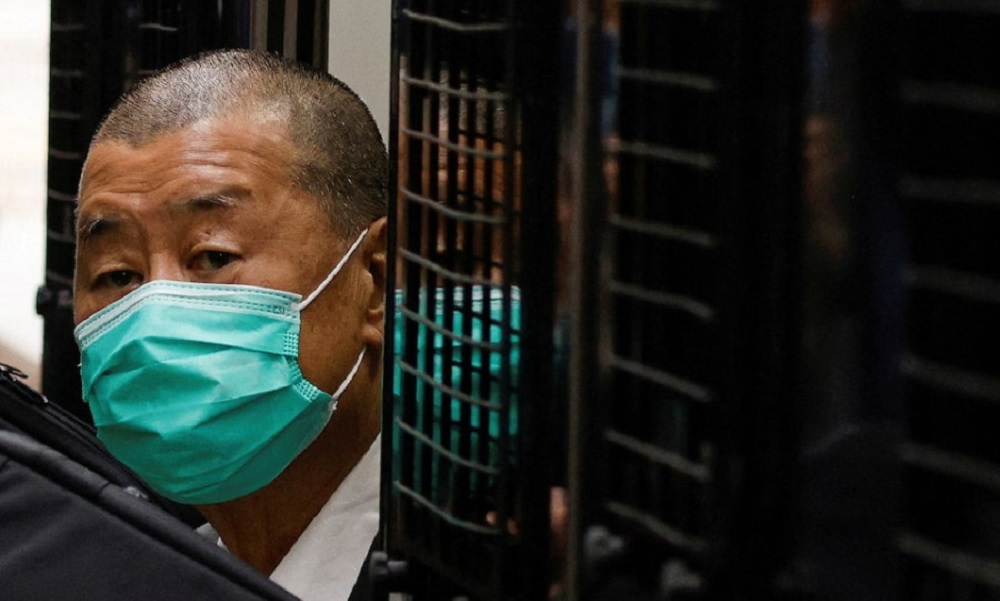
Hong Kong’s most prominent media tycoon Jimmy Lai was sentenced on Monday to a total of 20 years in jail on national security charges comprising two counts of conspiracy to collude with foreign forces and one of publishing seditious materials.
The sentence ends a legal saga spanning almost five years, and Hong Kong’s most high-profile national security hearing. Lai, founder of the now-shuttered Apple Daily newspaper, was first arrested in August 2020 and convicted last year, Reuters reported.
Lai’s sentence of 20 years was within the most severe penalty “band” of 10 years to life imprisonment for offences of a “grave nature”.
The Hong Kong court said Lai’s sentence was enhanced by the fact that he was “mastermind” and driving force behind foreign collusion conspiracies.
The 78-year-old, a British citizen, has denied all the charges against him, saying in court he is a “political prisoner” facing persecution from Beijing.
Lai’s plight has been criticised by global leaders, opens new tab including U.S. President Donald Trump and British Prime Minister Keir Starmer, spotlighting a years-long national security crackdown in the China-ruled Asian financial hub, following mass pro-democracy protests in 2019.
“The rule of law has been completely shattered in Hong Kong. Today’s egregious decision is the final nail in the coffin for freedom of the press in Hong Kong,” said Jodie Ginsberg, CEO of the Committee to Protect Journalism.
“The international community must step up its pressure to free Jimmy Lai if we want press freedom to be respected anywhere in the world.”
Lai arrived to court in a white jacket, with hands held together in a praying gesture as he smiled and waved at supporters.
The case has drawn calls for the long-standing critic of the Chinese Communist Party, who friends and supporters say is in frail health, to be freed.
“The harsh 20-year sentence against 78-year-old Jimmy Lai is effectively a death sentence,” said Elaine Pearson, Asia Director of Human Rghts Watch. “A sentence of this magnitude is both cruel and profoundly unjust.”
Dozens of Lai’s supporters queued for several days to secure a spot in the courtroom, with scores of police officers, sniffer dogs and police vehicles including an armoured truck and a bomb disposal van deployed around the area.
“I feel that Mr. Lai is the conscience of Hong Kong,” said a man named Sum, 64, who was in the queue.
“He speaks up for Hong Kong people, and even for many wrongful cases in mainland China and for the development of democracy. So I feel that spending a few days of my own freedom sleeping out here is better than seeing him locked up inside.”
Starmer raised the case of Lai, who holds British citizenship, in detail during a tête-à-tête with Chinese leader Xi Jinping last month in Beijing’s Great Hall of the People, according to people briefed on the discussions. Britain’s national security adviser, Jonathan Powell, and China’s foreign minister, Wang Yi, were also present.
“I raised the case of Jimmy Lai and called for his release,” Starmer told the UK parliament after his trip.
Trump too, raised Lai’s case with Xi during a meeting last October. Several Western diplomats told Reuters that negotiations to free Lai would likely begin in earnest after he is sentenced, and depending on whether Lai will appeal.
LIFE IN PRISON?
Lai’s family, lawyer, supporters and former colleagues have warned that he could die in prison as he suffers from health conditions including heart palpitations and high blood pressure.
Besides Lai, six former senior Apple Daily staffers, an activist and a paralegal will also be sentenced.
“Jimmy Lai’s trial has been nothing but a charade from the start and shows total contempt for Hong Kong laws that are supposed to protect press freedom,” said the Committee to Protect Journalists’ Asia-Pacific Director Beh Lih Yi.
Beijing, however, says Lai has received a fair trial and all are treated equally under the national security law that has restored order to the city.
World
Trump signs order threatening tariffs on nations doing business with Iran

U.S. President Donald Trump signed an executive order on Friday that may impose a 25% tariff on countries that do business with Iran.
The order comes as tensions between Iran and U.S. continue to simmer even as the two countries engaged in talks this week.
World
Trump rejects Putin offer of one-year extension of New START deployment limits
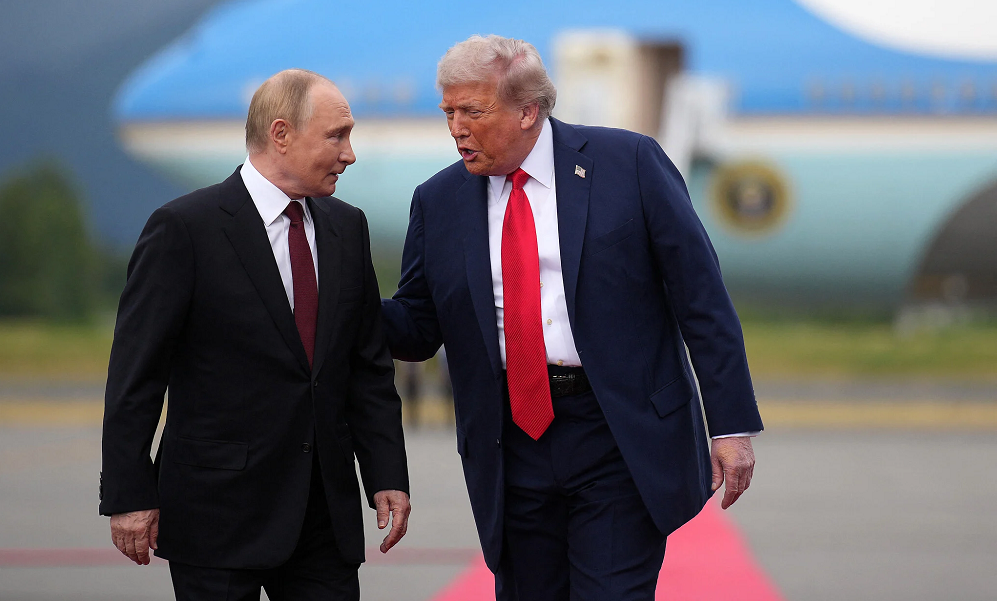
U.S. President Donald Trump on Thursday rejected an offer from his Russian counterpart to voluntarily extend the caps on strategic nuclear weapons deployments after the treaty that held them in check for more than two decades expired.
“Rather than extend “New START … we should have our Nuclear Experts work on a new, improved and modernized Treaty that can last long into the future,” Trump wrote in a post on his Truth Social platform, Reuters reported.
Arms control advocates warn that the expiration of the treaty will fuel an accelerated nuclear arms race, while U.S. opponents say the pact constrained the U.S. ability to deploy enough weapons to deter nuclear threats posed by both Russia and China.
Trump’s post was in response to a proposal by Russian President Vladimir Putin for the sides to adhere for a year to the 2010 accord’s limit of 1,550 warheads on 700 delivery systems — missiles, aircraft and submarines.
New START was the last in a series of arms control treaties between the world’s two largest nuclear weapons powers dating back more than half a century to the Cold War. It allowed for only a single extension, which Putin and former U.S. President Joe Biden agreed to for five years in 2021.
In his post, Trump called New START “a badly negotiated deal” that he said “is being grossly violated,” an apparent reference to Putin’s 2023 decision to halt on-site inspections and other measures designed to reassure each side that the other was complying with the treaty.
Putin cited U.S. support for Ukraine’s battle against Russia’s 2022 full-scale invasion as the reason for his decision.
White House spokeswoman Karoline Leavitt told reporters that the U.S. would continue talks with Russia.
BOTH SIDES SIGNAL OPENNESS TO TALKS
Earlier, Kremlin spokesman Dmitry Peskov said Russia was still ready to engage in dialogue with the U.S. if Washington responded constructively to Putin’s proposal.
“Listen, if there are any constructive replies, of course we will conduct a dialogue,” Peskov told reporters.
The UN has urged both sides to restore the treaty.
Besides setting numerical limits on weapons, New START included inspection regimes experts say served to build a level of trust and confidence between the nuclear adversaries, helping make the world safer.
If nothing replaces the treaty, security analysts see a more dangerous environment with a higher risk of miscalculation. Forced to rely on worst-case assumptions about the other’s intentions, the U.S. and Russia would see an incentive to increase their arsenals, especially as China plays catch-up with its own rapid nuclear build-up.
Trump has said he wants to replace New START with a better deal, bringing in China. But Beijing has declined negotiations with Moscow and Washington. It has a fraction of their warhead numbers – an estimated 600, compared to around 4,000 each for Russia and the U.S.
Repeating that position on Thursday, China said the expiration of the treaty was regrettable, and urged the U.S. to resume dialogue with Russia on “strategic stability.”
UNCERTAINTY OVER TREATY EXPIRY DATE
There was confusion over the exact timing of the expiry, but Peskov said it would be at the end of Thursday.
Russia’s Foreign Ministry said Moscow’s assumption was that the treaty no longer applied and both sides were free to choose their next steps.
It said Russia was prepared to take “decisive military-technical countermeasures to mitigate potential additional threats to national security” but was also open to diplomacy.
That warning was in apparent response to the possibility that Trump could expand U.S. nuclear deployments by reversing steps taken to comply with New START, including reloading warheads on intercontinental ballistic missiles and submarine-launched missiles from which they were removed.
A bipartisan congressionally appointed commission in 2023 recommended that the U.S. develop plans to reload some or all of its reserve warheads, saying the country should prepare to fight simultaneous wars with Russia and China.
Ukraine, which has been at war with Russia since Moscow’s 2022 invasion, said the treaty’s expiry was a consequence of Russian efforts to achieve the “fragmentation of the global security architecture” and called it “another tool for nuclear blackmail to undermine international support for Ukraine.”
Strategic nuclear weapons are the long-range systems that each side would use to strike the other’s capital, military and industrial centres in the event of a nuclear war. They differ from so-called tactical nuclear weapons that have a lower yield and are designed for limited strikes or battlefield use.
If left unconstrained by any agreement, Russia and the U.S. could each, within a couple of years, deploy hundreds more warheads, experts say.
“Transparency and predictability are among the more intangible benefits of arms control and underpin deterrence and strategic stability,” said Karim Haggag, director of the Stockholm International Peace Research Institute.
-

 Latest News3 days ago
Latest News3 days agoAfghanistan to grant one- to ten-year residency to foreign investors
-

 Sport4 days ago
Sport4 days agoIndonesia shock Japan to reach historic AFC Futsal Asian Cup final
-

 Sport5 days ago
Sport5 days agoMilano Cortina 2026 Winter Olympics: What You Need to Know
-

 Sport3 days ago
Sport3 days agoIran clinch AFC Futsal Asian Cup 2026 in penalty shootout thriller
-

 Latest News3 days ago
Latest News3 days agoAfghanistan says Pakistan is shifting blame for its own security failures
-
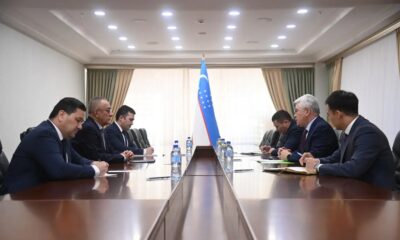
 Latest News5 days ago
Latest News5 days agoUzbekistan, Kazakhstan discuss cooperation on Afghanistan
-

 International Sports2 days ago
International Sports2 days agoWinter Olympics gain momentum as medal table takes shape
-

 Latest News5 days ago
Latest News5 days agoAfghanistan facing deepening hunger crisis after US Aid Cuts: NYT reports








